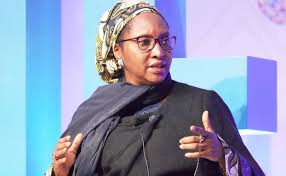The Federal Government of Nigeria has restated its resolution to stop subsidizing petroleum products next year.
This was disclosed by the Minister of Finance, Budget and National Planning, Zainab Ahmed on Monday while meeting with the House of Representatives Committee on Finance in Abuja on the details of the 2023-2025 Medium-Term Expenditure Framework and Fiscal Strategy Paper.
The minister said petrol subsidy would remain up to mid-2023, following the 18-month extension announced early this year.
The halt is expected to take effect June/July 2023 after President Muhammadu Buhari leaves office on May 29.
She added that the Federal Government is proposing an aggregate expenditure of N19.76 trillion for the 2023 financial year, with a projected deficit of N11.30 trillion.
Ahmed noted that the amount being used to service debt had overshot appropriation in the 2022 budget.
The minister said 60 percent of revenue was to be spent on debt servicing, but the ratio went up to 90 per cent.
“We have been able to, consistently without fail, serviced our debt and we do not have any projections that we will fail.
“We follow the Medium Term Debt Management Strategy strictly; debts are not taken haphazardly, they are planned”,
“In addition to subsidy reform, this scenario assumes an aggregate implementation of cost-to-income limit of Government Owned Companies. With these, the 2023 FGN revenue is projected at N8.46tn out of which N.99tn or 23 per cent is projected to come from oil revenue sources.”
“The business-as-usual scenario assumes that subsidy on PMS, which is estimated to be N6.7tn for a full year, will remain in 2023 and be fully provided for, while another scenario is the reform scenario which assumes that petrol subsidy will remain up to mid 2023 based on the 18 month extension announced early 2021, in which case, only N3.6tn will be provided for,” she added
According to Mrs Zainab, the Federal Government is projecting the total revenue of N8.46 trillion, out of which N1.9 trillion is expected to come from oil-related sources while the remaining is to come from non-oil sources.
Meanwhile, the Federal Government is expected to peg crude oil price at $70 per barrel at an exchange rate of N435.57 per dollar, while real Gross Domestic Product (GDP) is projected at 3.7 percent and inflation at 17 to 16 percent.
The minister added that the GDP is expected to grow at 3.75 per cent, while an upward pressure on prices is expected to be driven by the current and lag effect of the global price surge due to the Russia-Ukraine war, domestic insecurity, rising costs of imports, exchange rate depreciation as well as other supply side constraints.
In his reaction,Chairman of the committee on Finance, James Faleke, pointed out that in the current financial situation in the country, all revenue sources explored by the government were short of revenue.
Faleke said it was obvious that when there is no revenue, every aspect of the country suffers and asked all agencies appearing before the committee to provide the committee with the correct position of their revenue.
He warned that no agency of government would be allowed to play with the revenue of the country


